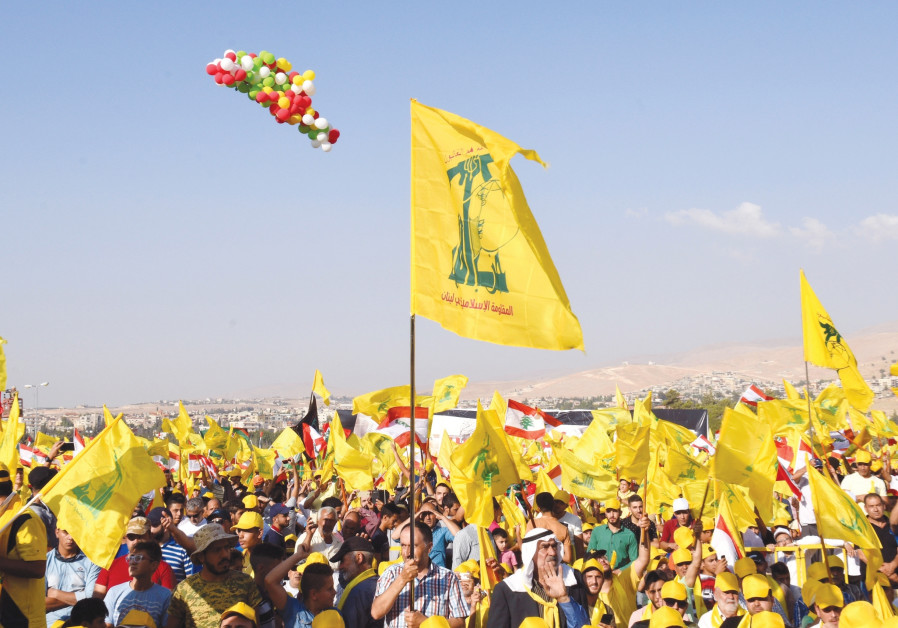Hezbollah footage from 2005 shows abduction attempt

SUPPORTERS OF Hezbollah leader Sayyed Hassan Nasrallah display Hezbollah and Lebanese flags in Baalbek, Bekaa valley in eastern Lebanon in August last year. (Hassan Abdallah/Reuters). (photo credit: HASSAN ABDALLAH / REUTERS)
Hezbollah-affiliated media released footage Sunday night of clashes with IDF troops in 2005 after an infiltration of the northern village of Ghajar.
The video, which was uploaded by Hezbollah’s Al-Manar website, shows terrorists from groups led by Muhammed Qansu engaging with IDF troops in the village that straddles both the Israeli-controlled Golan Heights and Lebanon.
The terrorists infiltrated into Ghajar as other Hezbollah terrorists began shelling Israeli positions in Mount Dov, also known as the Shaba Farms, an area of some 160 sq. km. which is held by Israel but which Hezbollah disputes as belonging to Lebanon.
The gunmen fired on IDF positions with mortar and rocket fire, and struck and damaged military equipment, as well as a civilian home in Metulla to distract the IDF from the kidnapping operation in Ghajar.
The kidnapping attempt was thwarted by paratroopers who had been patrolling near Ghajar, and Pvt. David Markovitz opened fire on the militants, killing all four of them.
In response, Israeli jets struck a Hezbollah command post in southern Lebanon, as well as several roads used by the group to transport supplies. Hezbollah then fired a salvo of mortars and Katyusha rockets.
While no IDF troops were killed in the exchange, eight soldiers were wounded, as were three civilians.
The incident, which lasted several hours, was the most sustained round of fighting between the two sides for months until the Second Lebanon War a year later. The incident came after IDF forces were on alert for possible kidnapping attempts in the Shaba Farms area by Hezbollah.
(function(w,d,s,i){w.ldAdInit=w.ldAdInit||[];w.ldAdInit.push({slot:10834723912266086,size:[0, 0],id:”ld-9628-9059″});if(!d.getElementById(i)){var j=d.createElement(s),p=d.getElementsByTagName(s)[0];j.async=true;j.src=”//cdn2.lockerdomecdn.com/_js/ajs.js”;j.id=i;p.parentNode.insertBefore(j,p);}})(window,document,”script”,”ld-ajs”);
Israel and Hezbollah fought a deadly 33-day war in 2006, which came to an end under UN Security Council Resolution 1701. The resolution called for disarmament of Hezbollah, for withdrawal of the Israeli army from Lebanon, for the deployment of the Lebanese army and an enlarged UN force in the south.
Since then, hostilities between Israel and Hezbollah have been limited to occasional firing across the border and reported air strikes by Israel against Hezbollah leaders and military equipment in Syria, where the group is fighting in support of President Bashar Assad.
In 2015, two IDF soldiers were killed and seven wounded after Hezbollah fired anti-tank missiles towards an unarmored military vehicle in the Mount Dov area. It is believed that five Kornet anti-tank missiles were fired by the Lebanese Shi’ite terror group in retaliation to an air strike in Syria which killed seven Hezbollah operatives a week earlier.
While the border with Lebanon has since been relatively quiet, the IDF nonetheless sees the border as the most explosive, with troops ready for the quiet to be broken at any instant.






Comments are closed.